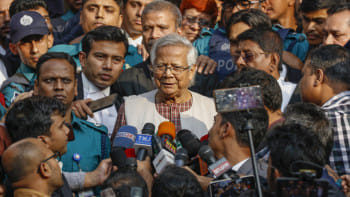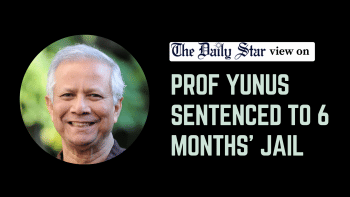So who filed the case against Dr Yunus?

One of the most misleading claims going around in recent times has been that it wasn't the government, but rather the employees of Grameen Telecom, who filed the case against Dr Muhammad Yunus and three other directors of the not-for-profit firm, in which the Third Labour Court of Dhaka returned a guilty verdict on January 1. Although this has been debunked by some sections of the media and certainly on social media, it has continued to "have legs," as it were, thanks to being repeated from the most exalted of platforms, and by some very, very highly placed individuals indeed.
It was there in a September statement by the Supreme Court Bar Association, whom you wouldn't expect to mislead the public on such matters, where it said, "The government filed no cases against him on labour issues; rather the cases were filed by the oppressed labourers for materialising their legal lawful and genuine claim and right."
That same month, in fact on the very first day of the month, a journalist and editor went on DW Bangla Editor Khaled Mohiuddin's very popular Friday night show and kept repeating it—at least thrice, by my count—going unchallenged throughout. In his case, though, it may just have been ignorance that caused the faux pas. In fact, the entire claim seems to rely upon a mixture of ignorance and indifference on the public's part to prevent the truth from coming out. Its proponents may be surprised at how irrefutably the truth can actually be obtained in this case.
We're going to look at a High Court judgment of August 8, in a case where Dr Yunus and his co-accused challenged the framing of the charges against them by the Third Labour Court. The judgment was later also upheld by a full bench of the Appellate Division, allowing the case in the labour court to proceed. It is available on the Supreme Court's official website. To help readers, all the parts lifted from the judgment are done so verbatim and quoted in italics:
Facts in short are that Mr. S.M. Arifuz Zaman, Labour Inspector (General) Department of Inspection, Factories and Establishment, Dhaka lodged a complaint on 20.08.2021 with the third Labour Court, Dhaka alleging that in course of inspection of Grameen Telecom Company (hereinafter referred to as GTC) he detected the infringements of the following provisions of Bangladesh Labour Ain, 2006 and Bangladesh Labour Rules, 2015.
(1) On completion of probationary period jobs of the labourers and employees are not made permanent in violation of section 4(7)(8) of the Bangladesh Labour Ain, 2006 (herein after referred to Act No.42 of 2006)
(2) Labourers and Employees are not granted annual leave with pay or money against earned leave in violation of section 117 of Act No.42 of 2006, and,
(3) Labourers Participatory Fund and Labour Welfare Fund were not constituted and 5% of the net profit of the GTC was not deposited in above funds under the Labour Welfare Foundation Law, 2006.
The part quoted above, from introduction to the judgment, states very clearly that an inspector of the DIFE, which is a government agency, filed the complaint following an inspection, that entails a visit, of GTC. There is no mention of any worker ever coming to the DIFE and informing them of labour practices at the firm, or the inspector hearing about it somewhere and then deciding to visit, or any other way in which they came to be aware of the issues raised in the complaint.
Later, Justice SM Kuddus Zaman, who authored the verdict on behalf of himself and Justice Shahed Nuruddin, writes about a reference to case law made by Dr Yunus's lawyer:
In the case of S.M. Jahidul Islam and others Vs. Syed Ahmed Chowdhury reported in 4 CLR (AD) 2016 the Appellate Division has opined that no complaint under above Ain should be made directly under section 307 without seeking redress to the Labour Court for nonpayment of service benefits.
Section 307 of the Labour Act says that whoever "contravenes or fails to comply with any provision of this Act or any rules, regulations or schemes" shall be punishable with a fine or imprisonment, i.e. it brings punishment in the form of a prison sentence into the picture for violations of the act.
Towards the end, while dealing with the case law reference, or in his effort to nullify the argument, Justice SM Kuddus Zaman writes:
"We have carefully gone through the judgement of the Supreme Court of Bangladesh reported in 4 CLR (AD) (2016) and found that above case was filed by an individual labourer for realization of his service benefits. On the other hand this case was filed by an authorized Inspector of the Government…"
This is key. As we can see, the judgment here has even differentiated between the two cases on the basis that one was filed by a labourer, and one by an officer of the government. First, we understand that the case could have been filed by a worker, if one was minded to do so. But unless I'm forgetting my English, this case, i.e. the one the judgment concerns itself with, was filed by someone in his or her capacity ("authorized") as an "Inspector of the Government." It really couldn't be clearer who filed the case.
Elsewhere, while describing the DIFE inspector's activities in relation to the case, Justice Kuddus Zaman writes how the visit that led to him filing the case on August 20, 2021 was made "on the direction" of a higher authority: "On the direction of the higher authority he again inspected GTC on 06.08.2021 and finding repetition of above violations…"
Now, surely this "higher authority" could not have been a member of the GTC staff. They enjoy no authority, obviously, over officials of DIFE, which according to its own website, "is an autonomous government agency responsible for health and safety inspection in factories and industries in Bangladesh."
From all that we've seen already, it is very clear that it was the government, through one of its agencies, that filed the case. That is what anybody means when they say the government filed the case, because that is how the government works—through its agencies.
Indeed, it is a feature of the case that not a single worker was called even as a witness in the trial, which becomes clearer once you read the verdict handed down by Sheikh Merina Sultana, chairperson of the Third Labour Court, on January 1. It contains summaries of the witness statements. I have come in possession of a certified, unamended transcript of the verdict, translated to English, but since Labour Court verdicts are not publicly released, I cannot hyperlink it.
In it, though, we find that all four of the witnesses called by the state were labour inspectors with DIFE. The very first witness testified that "the accused have been sued on the basis of the information found in the checklist during the inspection." Again, no mention of any information gleaned from workers. Later, while explaining their reasons behind filing each of the three charges that they did, the same witness testifies, and we'll take these one by one to end here. Once again, parts lifted verbatim from the verdict are in italics:
On workers not being permanent: It is true that no worker has complained to us that the jobs of the workers have not been made permanent. Even though there is no complaint from the workers, we carried out the inspection because the organization has to be inspected according to the Annual Performance Agreement.
On annual paid leave: No worker has complained to us in this regard. It is not true that if a worker of Grameen Telecom applies for accrued leave and it is not granted, then his leave shall be added as per law in addition to the limit mentioned in (5) and (6), should be added according to law. But in its reply dated 09/03/20, Grameen has said that after completing the apprenticeship period and on becoming regular, the employees get the earned leave and the need is encashed.
On WPPF benefits, a reference is made to a separate case: It may be noted here that a total of 107 officers/employees of Grameen Telecom have filed a case against the organization for the benefits of WPPF. The case is currently pending in the 3rd Labour Court. If the judgment in this case is promulgated, you will be informed about it and necessary steps will be taken to implement the promulgated judgment.
He later adds: The cases filed by the workers are part of the government's 80:10:10 by law, that's why government filed a case.
So the witness himself has differentiated between two cases, where one is brought by the workers, on the basis of which the government has added an allegation to its own case. Yet, as far as the workers' involvement in the government's case goes, we have seen enough to conclude that not only did they not file the case, but they hardly played any part in it at all.
Shayan S Khan is executive editor of the Dhaka Courier.
Views expressed in this article are the author's own.
Follow The Daily Star Opinion on Facebook for the latest opinions, commentaries and analyses by experts and professionals. To contribute your article or letter to The Daily Star Opinion, see our guidelines for submission.

 For all latest news, follow The Daily Star's Google News channel.
For all latest news, follow The Daily Star's Google News channel. 











Comments